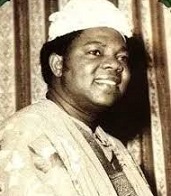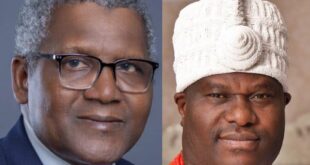The success of a man, it is often said, is not in ever failing, but in rising each time he falls.
That timeless truth perfectly describes the extraordinary journey of Chief Commander Ebenezer Obey-Fabiyi, one of Nigeria’s most revered musical icons. His story is one of perseverance, divine grace, and unrelenting faith in destiny.
Before his birth, Obey’s mother, Abigail, endured twenty long years of childlessness in her first marriage in Lagos.
After two decades without a child, she was labeled barren, and her husband’s family dissolved the union – “What God hath joined together was put asunder by men.”
Broken but not defeated, Abigail relocated to Idogo, in what is today Yewa South Local Government Area of Ogun State. There, she met Fabiyi, an Egba man who worked as a carpenter and cocoa trader.
“Ile aanu Oluwa ki í sú” (The house of God’s mercy never grows weary). Like Sarah in the Bible, Abigail’s reproach was lifted. God blessed her with a child, fulfilling His promise and turning sorrow into joy.
In 1942, she gave birth to a baby boy, whom they named Ebenezer Oluwaremilekun Olasupo – meaning “Thus far the Lord has helped me.” Later, a daughter joined the family, sealing their joy and gratitude.
Ebenezer attended Methodist Primary School in Idogo, where his talent for music first shone. His teachers appointed him as the school’s band leader – a role that sharpened his musical instincts and performance skills.
Fueled by passion, he later formed his first band, the Ifelodun Mambo Orchestra, in Idogo. Indeed, as the saying goes, the hidden talents and potentials in all of us will one day be revealed for progress and achievement.
In 1957, young Obey renamed his group Royal Mambo Orchestra and decided to seek greater opportunities in Lagos.
He left Idogo with two companions – Akinyomi Savage and Bamgbose Jumoda (popularly known as Abengo Mayana).
In Lagos, he joined the late Fatai Rolling Dollar’s band as a guitarist and vocalist, where he learned the intricacies of stage performance and band management.
For six years, Obey honed his craft under Rolling Dollar before setting out to form his own band.
Determined to succeed, Obey established The International Brothers Band. But financial hardship struck – no promoter would back his music.
Desperate and full of faith, he decided to trek from Mushin to Lagos Island, about 20 kilometres, to seek an opportunity with DECCA West Africa Limited, a major recording company.
He walked through Mushin, Yaba, Oyingbo, Iddo, and Carter Bridge – long before the existence of Eko or Third Mainland Bridge – until he reached DECCA’s office on Abibu-Oki Street.
On arrival, an Igbo gateman refused him entry, but Obey’s persistence prevailed. Inside, the Secretary told him the Artiste Manager was on leave. Disappointed and weary, Obey left and prayed earnestly for divine direction: “Eledumare lo le f’ona han ni; ayafi Oba mimo lo le f’ona han wa o l’aye.” (Only God can show the way; only the Holy One can guide us through life.)
After a week of prayer, he returned to DECCA, still met with resistance, but refused to give up.
“I am a star, and I have come to record for your company,” Obey boldly told the secretary. His persistence drew the attention of Mr. C. K. Cress, the British Managing Director, who overheard the commotion and invited him in.
Confidently, Obey declared, “Just record me and don’t pay me until you see the result. My record will sell.” Moved by his determination, Mr. Cress ordered the Artiste Manager, Mr. Ogunsanya, to give him a trial.
DECCA recorded five of Obey’s songs out of the eight he had prepared. Despite his efforts to persuade distributors to buy his album, sales stalled at 481 copies – 19 short of the 500-copy mark required for recognition.
Mocked by staff as “the future star who failed,” Obey’s fate hung in the balance. But Mr. Cress, impressed by his optimism, personally bought 25 copies to meet the qualification threshold.
His debut album, “E Wo Ohun Oju Ri”, released in 1964, sold 506 copies – marking the humble beginning of a glorious career.
Obey’s second album, “Olomi Gbo T’emi (My Dearest Wife, Listen to Me)”, released in 1965, became an instant success. That same year, his hit track “Palongo” catapulted him to national fame. From that point on, the name Ebenezer Obey became synonymous with Juju music excellence.
When the Nigerian Indigenisation Decrees of 1972 and 1976 took effect, DECCA West Africa Limited was acquired by Nigerian investors.
To the astonishment of many, Chief Moshood Abiola and Chief Ebenezer Obey emerged as co-owners – renaming it Afrodisia Limited.
In an incredible twist of fate, the once-rejected young artiste became the employer of his former Managing Director and other staff of the company that once doubted him.
Ebenezer Obey went on to establish his own music label and inspire generations with timeless hits that blend melody, wisdom, and spirituality.
Today, he stands as an evergreen Juju music icon and a devoted evangelist – a shepherd of God’s flock.
“L’abe igi orombo, ibe la gbe n s’eré wa, inu wa dun, ara wa ya…” (Under the orange tree we make merry, our hearts are glad and our bodies rejoice.)
Truly, the stone which the builders once rejected has become the cornerstone.
“Ai m’asiko lo n dààmú èdá o; òrò mi l’ọwọ Oluwa lo wa. Ire t’emi kò ní kọja mi.”
(It is ignorance of timing that troubles man; my destiny is in God’s hands, and my blessings shall not pass me by.)
 Startrend International Magazine For Your Latest News And Entertainment Gists
Startrend International Magazine For Your Latest News And Entertainment Gists





